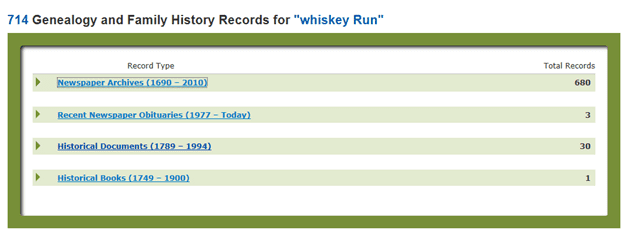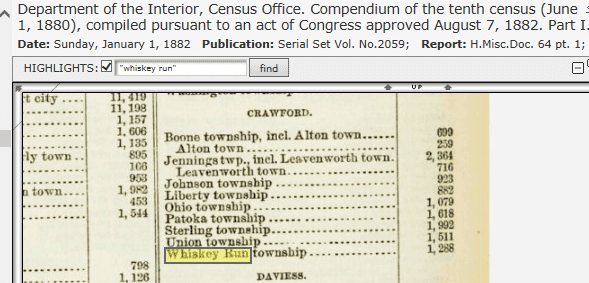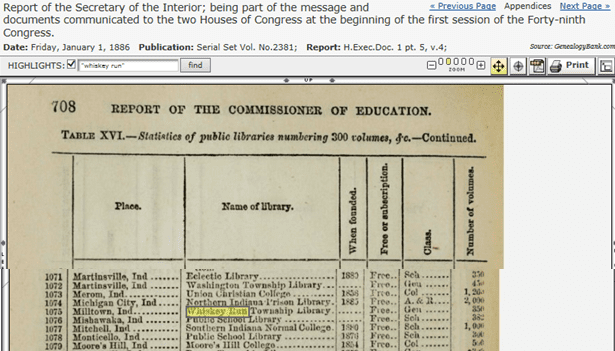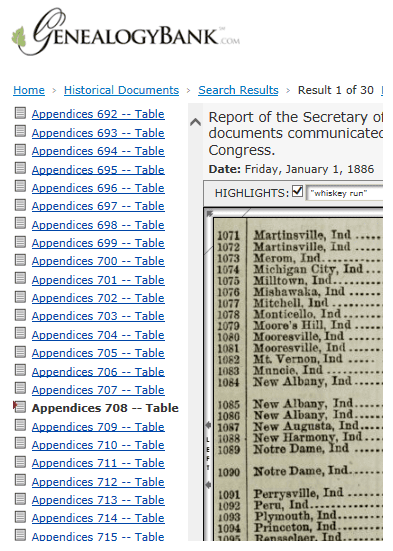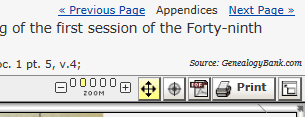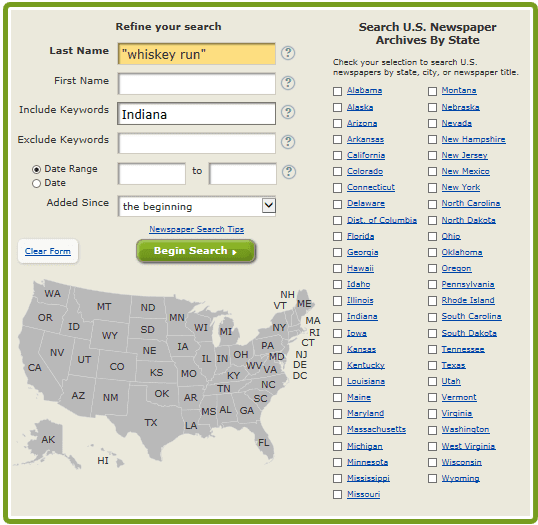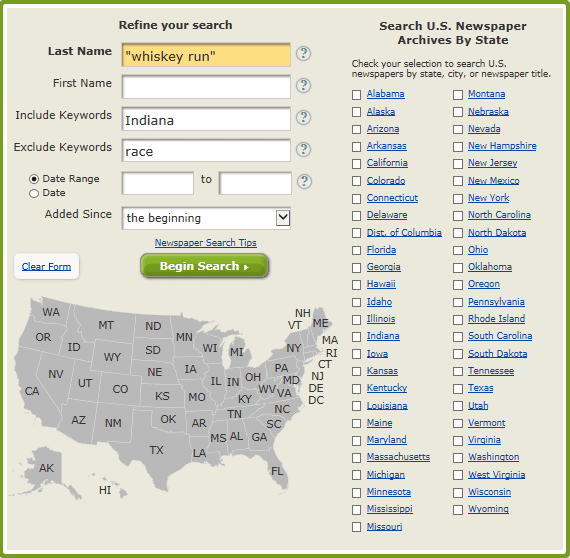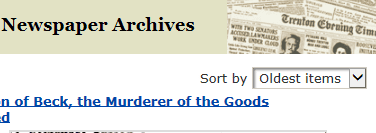Introduction: In this article, Duncan Kuehn shows how to find information about your ancestral hometown using GenealogyBank’s collections of historical documents and old newspapers, as well as a couple of other helpful websites. Duncan is a professional genealogist with over eight years of client experience. She has worked on several well-known projects, such as “Who Do You Think You Are?” and researching President Barack Obama’s ancestry.
GenealogyBank is not only a great resource to find information about your ancestors’ lives—you can learn about their hometowns as well.
For example, I am curious to see if I can find any information about a tiny township that my family is from, located in rural Indiana. This township has an unusual name that I have always found slightly amusing: Whiskey Run, Crawford County, Indiana.
How to Search for Hometowns with GenealogyBank
I begin my search by typing “Whiskey Run” in the last name field (see below). The quotation marks keep the words together as a phrase. GenealogyBank’s search engine allows you to enter names or words into the first and last name fields.
This archive search brings back quite a few results: 714! I’m a bit surprised to see so many for such an unusual name. There are 30 results in the Historical Documents collection that I want to look through first.
How to Search the U.S. Congressional Serial Set
GenealogyBank’s Historical Documents collection largely consists of the U.S. Congressional Serial Set, along with other government documents. The Serial Set was organized in 1817 as the official collection of reports and documents of the United States Congress. This large multivolume resource contains various congressional reports and documents from the beginning of the federal government right up to the present day. The collection is published in a “serial” fashion, hence its name. Containing a combination of legislative and executive publications, the Serial Set has tremendous value as a primary source for American history.
Normally, any mention of politics or Congress would be enough to put me to sleep, but these government documents have been some of my best finds. They contain all sorts of information relating to pensions, land disputes, military service, etc. I even found a firsthand account of a many-great grandfather’s experience in the Civil War. Where else, but a journal, could you find such outstanding information!
Let’s see what we can find in these 30 Historical Documents about Whiskey Run.
There are various pages relating to the functions of the township. A few are of particular interest. Here’s one: this page tells me the population of the various townships in Crawford County in 1880.
And here is another that tells me the public library had 350 books in 1886. Not bad for such a small township.
A quick tip for navigating through the pages of these historical documents: I can easily move forward or backward in the document by clicking on the page numbers along the left hand side of the page, as shown here:
I can also move through the document sequentially by using the “Previous Page” and “Next Page’ tools along the top right side of the image, as shown here:
Searching the Newspaper Archives
While I found some interesting tidbits about the township in these Historical Documents, I haven’t struck gold yet. I want to go back and search through the Newspaper Archives now. I click on “Search All Collections” in the upper left hand corner to return to the main search results page.
Now that I am back to the main results page, I can see that 680 of the 714 results for “Whiskey Run” were in the Newspaper Archives.
I click into the Newspaper Archives collection to narrow my results. After scrolling to the bottom of the search results page, I narrow my search by typing Indiana in the keyword field. (I did not select just the state of Indiana when I began my search because that would have restricted my results to newspapers published only in the state of Indiana.) Newspaper articles can get picked up by many newspapers and be published literally anywhere in the United States.
I want to find articles about Whiskey Run of Indiana—not articles about running to get some booze, or the similarly-named townships in Pennsylvania and Virginia. Entering the word Indiana in the Include Keywords field will search for articles that mention both Whiskey Run and Indiana. So now my newspaper archives search looks like this:
Glancing through the new search results, I notice that there must have been a race horse in Indiana with the name Whiskey Run. To eliminate those articles from my search results, I add the term “race” in the Exclude Keywords field like this:
Now I have 20 articles left to explore about the township in my search results. I like to sort them with the oldest articles first so that I can read them chronologically. I arrange them by using the “Sort by” drop-down menu in the upper right hand corner of the results page, as shown here:
Now that I have everything sorted just the way I like, I can begin looking through the remaining results. Whiskey Run township was a sparsely populated township so it doesn’t take me long to look through these results. If the township were more popular there would have been many more articles written about it, in which case I could add, subtract, and adjust my keywords to get down to a reasonable number of results. I could also add a date range if I was only interested in a specific time period.
Once I pull up an article by clicking on its headline or image snippet, I can search for any word in the text. To change the word that is being highlighted in the article, I can type the new word into the find box and click on “Find,” like this:
My Ancestral Hometown Research Findings
I found a few news articles that list Whiskey Run as one of the strange place names in America. (I’m glad I’m not the only one who thinks so.) I found articles talking about the inhabitants and happenings in Whiskey Run. But I really struck gold with this article about the history and name of the county and township.
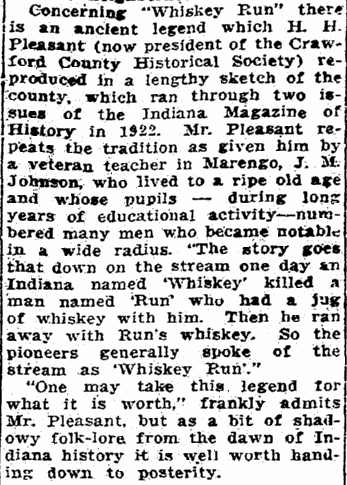

According to the old news article:
“The story goes that down on the stream one day an Indiana (sic) named ‘Whiskey’ killed a man named ‘Run’ who had a jug of whiskey with him. Then he ran away with Run’s whiskey. So the pioneers generally spoke of the stream as ‘Whiskey Run.’”
Since this newspaper article came out during the time of alcohol prohibition, I’m a little suspicious of this legend. A fast moving, low turbulence stream was called a “run” and several of my ancestors were arrested for making moonshine in the hills around the stream with the same name. I suspect that the township’s name probably had a different origin. But this makes for a fun story.
I learned many important historical facts about the Indiana town from this long article. Of particular interest was that Liberty Township was carved out of Whiskey Run in 1842. This helps me to know that the branch of the family that appears in Liberty around this time may not have moved after all. The area they were living in simply got annexed into Liberty Township. Good to know!
The results of my search on GenealogyBank were a bit surprising since Whiskey Run is such a small, rural township, and I was glad to find so much good information. To flesh out my ancestral hometown research, I could use two additional resources.
FamilySearch
The first is the Family History Research Wiki from FamilySearch. This is a free resource that usually gives me great background information on an area and explains how to find and access relevant documents. Unfortunately, Whiskey Run is too small to appear in this resource, but I can still look up Crawford County. Here I can find where the land, tax, and vital records are stored. It has lots of valuable information for me as I research this area.
HistoryPin.com
Another great resource is a new find for me. This site, History Pin.com, is a place for users to submit their historical photos of an area. Nothing came up for Whiskey Run, but I did find some spectacular images from the nearby township of English and the town of Corydon.
GenealogyBank’s collection of newspapers and the U.S. Congressional Serial Set can be an excellent way to learn more about the area in which your ancestors lived, even if it was a tiny township in a rural area. Try an ancestral hometown search yourself and let us know what you find out!


